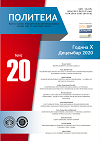Свакодневни облици отпора традиционалног српског сељаштва
Everyday Forms of Resistance of the Traditional Serbian Peasantry
Author(s): Srđan Lj. Šljukić, Marica N. ŠljukićSubject(s): Social history, Social psychology and group interaction, Studies in violence and power, Peace and Conflict Studies
Published by: Fakultet političkih nauka Univerziteta u Banjoj Luci
Keywords: Resistance; peasantry; power; Serbia;
Summary/Abstract: Weber’s definition of power includes the existence of a social relationship, but also a possibility of resistance and, consequently, a conflict with it. The resistance to the enforcement of the will on the part of the side with power takes various forms: violent and nonviolent, individual, and collective. In sociology, peasantry is seen as a social class without power, that is, the one that always stands opposite powerful social forces, which exert their will over it. In this paper, the authors pay attention to everyday forms of resistance used by peasantry and analyzed by J. Scott, an American researcher. Historically speaking, the Serbian peasantry used everyday forms of resistance as well, especially during the periods of foreign domination. Everyday forms of resistance can also be observed in some other powerless social entities. The consciousness of social actors usually does not go beyond the understanding of open forms of (violent) resistance. Besides these open forms of resistance (macro politics), however, there has always been the micro politics of resistance, that is, the everyday forms of resistance, especially practiced by traditional peasantry. In this paper, we focus on the hidden transcript (Scott) of the traditional Serbian peasantry, using the funny folk tales as a sociological material. Resistance can be understood as the other side of power, always present in relations of power, even though in various forms. Traditional peasantry, being a social class without power, often uses everyday forms of resistance and, at the same time, forms a special kind of its own ideology, a hidden transcript. Among other things, a hidden transcript includes folk songs, folk tales, etc. From funny folk tales of the traditional Serbian peasantry we can understand how the peasantry saw their relation with the oppressors (the Turks and others). In these tales it was especially important to show that peasants are cleverer than the oppressors, since the violent means were in the hands of the Turks. Once the situation had changed, the open resistance took place of everyday forms, and the power relation changed as well. The wider meaning and explanatory use of the concept of everyday forms of resistance can be seen in the fact that they can be used for understanding and explanation of behavior of any powerless group.
Journal: Politeia - Naučni časopis Fakulteta političkih nauka u Banjoj Luci za društvena pitanja
- Issue Year: 11/2021
- Issue No: 22
- Page Range: 11-24
- Page Count: 14
- Language: Serbian

